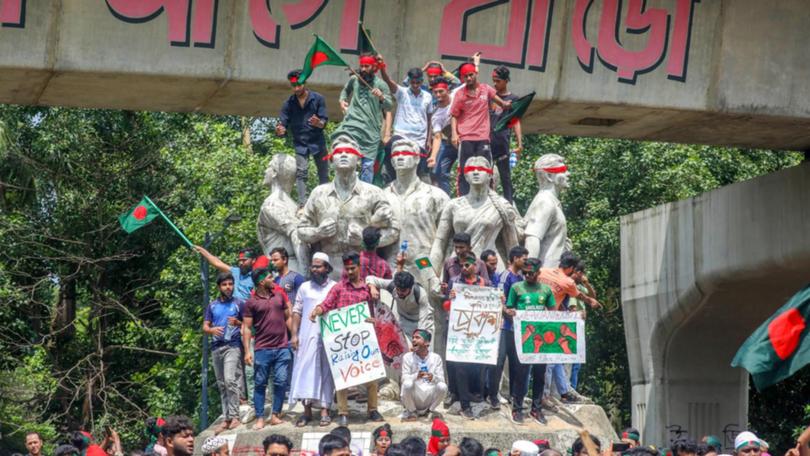Nearly 100 killed in riots as the government try to stall protesters calling for Bangladesh PM resignation
An indefinite nationwide curfew has been imposed as the death toll from violent clashes reached nearly 100 in Bangladesh.

Nearly 100 people have been killed and hundreds injured in clashes in Bangladesh, as police fired tear gas and rubber bullets to disperse tens of thousands of protesters calling for Prime Minister Sheikh Hasina to resign.
The government declared an indefinite nation-wide curfew starting at 6 pm local time on Sunday, the first time it has taken such a step during the current protests that began last month. It also announced a three-day general holiday starting from Monday.
The country’s leading Bengali-language daily newspaper, Prothom Alo, said at least 95 people, including at least 14 police officers, died in the violence. Channel 24 reported at least 85 deaths.
Sign up to The Nightly's newsletters.
Get the first look at the digital newspaper, curated daily stories and breaking headlines delivered to your inbox.
By continuing you agree to our Terms and Privacy Policy.The unrest, which has prompted the government to shut down internet services, is Hasina’s biggest test in her 20-year regime after she won a fourth straight term in elections that were boycotted by the main opposition Bangladesh Nationalist Party.
Critics of Hasina, along with human rights groups, have accused her government of using excessive force against protesters, a charge she and her ministers deny.
Demonstrators blocked major highways on Sunday as student protesters launched a non-cooperation program to press for the government’s resignation, and violence spread nationwide.
“Those who are protesting on the streets right now are not students, but terrorists who are out to destabilise the nation,” Hasina said after a national security panel meeting, attended by the chiefs of the army, navy, air force, police and other agencies.
“I appeal to our countrymen to suppress these terrorists with a strong hand.”
Police stations and ruling party offices were targeted as violence rocked the country of 170 million people.
Twelve policemen were beaten to death in the north-western district of Sirajganj, police official Bijoy Bosak said.
At least eight people, including two students and a ruling party leader, were killed and dozens injured amid fierce clashes in several places in the capital, Dhaka, police and witnesses said.
Two construction workers were killed on their way to work and 30 injured in the central district of Munsiganj, during a three-way clash of protesters, police and ruling party activists, witnesses said.
“They were brought dead to the hospital with bullet wounds,” said Abu Hena Mohammad Jamal, the superintendent of the district hospital.
Police said they had not fired any live bullets.
In the northeastern district of Pabna, at least three people were killed and 50 injured during a clash between protesters and activists of Hasina’s ruling Awami League party, witnesses said.
Three people were killed in violence in the northern district of Bogura, and 53 were killed in 12 other districts, hospital officials said.
At least 11,000 people have been arrested in recent weeks. The unrest has also resulted in the closure of schools and universities across the country, and authorities at one point imposed a shoot-on-sight curfew.
For the second time during the recent protests, the government shut down high-speed internet services, mobile operators said.
Social media platforms Facebook and WhatsApp were not available, even via broadband connections.
Bangladesh authorities instructed the country’s telecoms providers on Sunday to shut down 4G, effectively disabling internet services, according to a confidential government memo seen by Reuters.
Last month, at least 150 people were killed and thousands injured in violence touched off by student groups protesting against quotas for government jobs.
The protests paused after the Supreme Court scrapped most quotas, but students returned to the streets in sporadic protests last week, demanding justice for the families of those killed.
“I think the genie is out of the bottle and Hasina may not put it back in the bottle again,” said Shakil Ahmed, associate professor for government and politics at Jahangirnagar University.
“The prime minister should immediately form a national government to facilitate greater unity.”
with AP
